Ahead of the 2020 Guild Elections, News Editors John Wimperis, Aneesa Ahmed and Rhiannon Wood and News Reporter Charlie Young spoke to the candidates running to be International Officer
The International Officer is responsible for ensuring that international students get the support, services and representation they need from both the Guild and the University. They address the unique issues that students face when studying in a foreign country, campaigning against anything that prevents international students from having the same, full university experience as UK students.
The candidates are listed below in alphabetical order by surname.
You can vote on the Guild of Students website.
Moyosore Ale
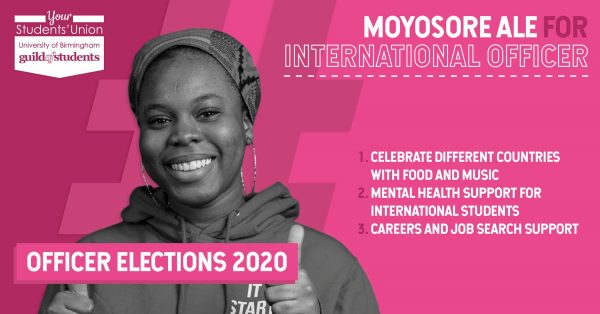
Moyosore did not have an interview with Redbrick. Her manifesto can be found online on the Guild of Students website.
Wei-Lun Chen: ‘Go all the Wei’
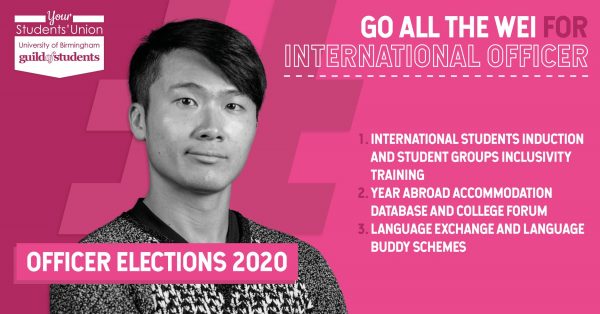
Final-year sport science student Wei-Lun Chen has been at the University of Birmingham for four years and believes that ‘there are improvements that need to be made.’ Wei-Lun said that International Officer was ‘still a fairly new role’ and that they wanted to represent all international students.
“There are improvements that need to be made
A key part of Wei’s campaign is increasing inclusivity. Wei wants to provide students with an induction because he feels that many are ‘unaware of lots of services provided by the Guild and University.’ In addition to this, he wants to give ‘inclusivity training’ to student groups and sports clubs to help them understand cultural differences. ‘Sports clubs are a great way to engage students,’ Wei told Redbrick. He said that he wants to close the information gap so that international students could engage with sports clubs more. He also told Redbrick that it was about community and that they ‘want to get to the point where international students and home students aren’t identifying as such but as UoB students.’
Wei also wants to support students studying abroad. He proposed creating a ‘database of partner university and accommodation’ and introducing a college forum to meet and interact with students.
Overcoming language barriers is also something Wei wants to work on. He plans to ‘introduce a language exchange scheme’ which can benefit all students at the University who want to learn a language.
Asked what he thought was missing from the University in terms of support for international students, Wei said that he wants to ‘provide more channels to reach out to international students to get [their] voices represented.’ He told Redbrick that he had previously worked with international students on communications matters.
“Wei told Redbrick that they ‘came to this University to meet people from all around the world’
Explaining what inspired him to run for this position, Wei told Redbrick that they ‘came to this University to meet people from all around the world.’ He said that they were ‘passionate about this role because of the work involved’ and that he ‘will be able to meet loads of students from different nations.’
Wei continued that he believed he can ‘make the student experience better’ and that this had inspired him to ‘continue this journey from last year.’ He added that he has been working on this for two years now.
Farhan Chin: ‘Han me your Votes’
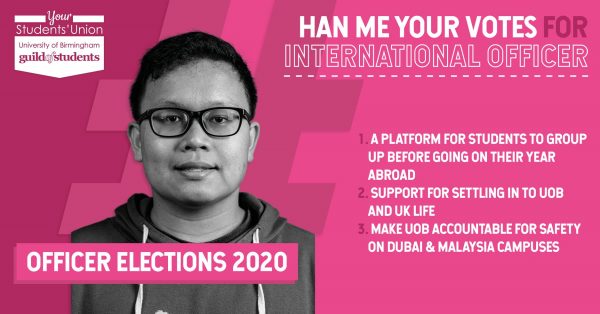
Farhan Chin, a second-year chemical engineering student is asking you to ‘Han me your votes’ for International Officer. He claims his campaign originally began as a joke, but now intends to follow through seriously, and feels he can help students.
He is running on a campaign to ‘address a few grievances of students’ and focuses his manifesto and ensuring international students ‘make the most of their lives at UoB,’ wellbeing, and calling for the university to be more transparent around the Dubai campus, and perceived controversies surrounding it.
One key element of his manifesto is to help international students get settled into university life in Birmingham, and to the UK culture as a whole which may come as a culture shock for some new students. To achieve this, he plans to collaborate with other Guild officers to make sure that new international students are engaged with Guild activities. He noted a small minority of international students get involved with sports clubs at the University, and many only join their nationality societies. Chin thinks a targeted push from sports clubs and societies, with the help of elected guild officers, could help to increase international student involvement.
“He plans to collaborate with other Guild officers to make sure that new international students are engaged with Guild activities
Farhan hopes to help international students plan their careers post-university, both by ensuring that students are able to plan their lives and careers after they leave UoB, and also by encouraging placement years, which may be harder to access for some students with less knowledge of the systems in place. He is also mindful of the welfare and wellbeing of students away on their year abroad and thinks more could be done to assist those studying abroad.
International student advisory services are also an important manifesto point. Pointing to long waiting times, particularly in reference to post-education work visas. He told Redbrick that, although the current International Officer [Joanne Park] does address this, work done to help the issue needs to be expanded.
Farhan also feels strongly over the Dubai campus, particularly surrounding the issues with LQBTQ+ safety and discriminatory legislation in the country. He told Redbrick that the University should be upfront and clear that many minority groups are unable to attend its partner campuses and says this is very disappointing.’
He notes that if elected, he will face a challenge in that he does not have a great deal of understanding of how the guild functions, however, he has been in contact with current the Park and hopes this will help him move into the role. He also sees tailoring the role to all international students, given the vast diversity on campus as a key challenge he would face.
Yernur Niyetkaliyev: ‘Yes for Yernur’
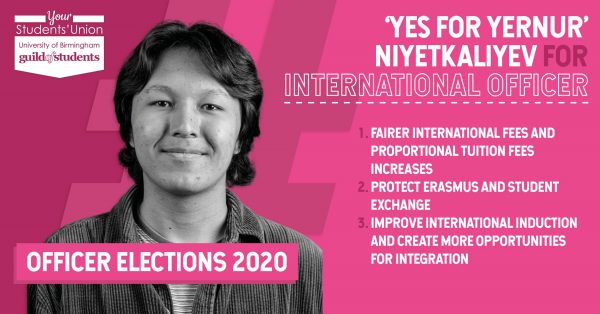
Yernur Niyetkaliyev, an international student from Kazakhstan, is keen to make other international students, like himself, feel like Birmingham is their home away from home. He views these students as the present and future of University of Birmingham’s global community. Concerned greatly with creating a sense of security and comfort for international students, Yernur proposes three core outcomes for his ‘Yes for Yernur’ campaign.
Firstly, he says ‘yes’ for fairer fees: He desires greater transparency and accountability; that international students are kept in the loop about how their money is being spent. Although aware of its difficulty, he aims to lobby for a proportional tuition fee increase, stressing that this outcome is not impossible. Yernur also proposes a pioneer careers fair, dedicated to both international and home students looking to work abroad.
Secondly, ‘yes’ for year abroad support: In particular, he wishes to expand the number of spaces at competitive universities on the International scheme. He looks also towards action to protect Erasmus and Student Exchange. Yernur crucially believes that not enough money is spent on vital communication for students on their year abroad; and that there needs to be better and more timely information, which ultimately prevents students from getting the most out of their year abroad.
“He believes this is due to a lack of trust between the two parties, brought out by fear and insecurity
Finally, ‘yes’ for a stronger community: He aims to create more opportunities for integration between home and international students, to bridge the current division. He believes this is due to a lack of trust between the two parties, brought out by fear and insecurity. To help solve this, Yernur suggests an improved induction process for international students, ensuring principally that people want to integrate and be a part of this community. This can be achieved through motives like Global Café. In combination with this, he seeks to promote culturally sensitive approaches to mental health, believing that there is a lot of stigma around mental health for international students.
“Though it isn’t everyone’s responsibility to integrate, it is encouraged, but can only occur in an environment which is mutually accepting
He also feels it’s important to acknowledge the real diversity of international students, specifically avoiding the generalisation that they come from Central and South-East Asia, and subsequently generalising their student experience.
He says this is ‘due to a lack of understanding between home and international students.’
‘Though it isn’t everyone’s responsibility to integrate, it is encouraged, but can only occur in an environment which is mutually accepting.’
He also feels that certain international students struggle with British English, suggesting that the University should hold more support sessions to help with this issue. He points out that lecturers often tailor their work towards home students, but that in itself excludes many people in their classes, so in many cases, academic needs and interests are overlooked.
Indeed, Yernur is an active policymaker, demonstrated through his current positioning the Guild Policy Development Group (GPDG) Committee as one of your International Students’ Representatives.
Shubhendu Tuli
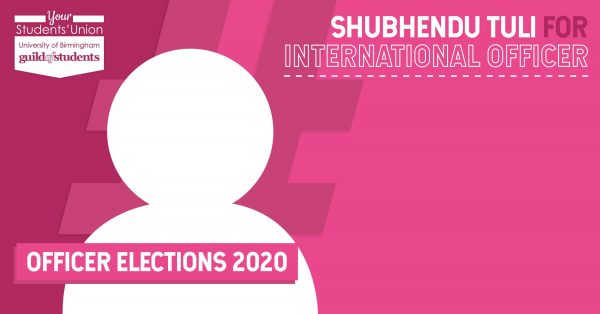
Shubhendu did not have an interview with Redbrick. They do not have a manifesto listed on the Guild of Students website.


Comments